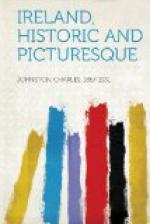But this Parliament was in no sense national or representative. It was wholly composed of the Scottish and English colonists and their friends, and the indigenous population had no voice in its deliberations. It is, therefore, the more honor to Henry Grattan that we find him addressing that Parliament thus: “I will never claim freedom for six hundred thousand of my countrymen while I leave two million or more of them in chains. Give the Catholics of Ireland their civil rights and their franchise; give them the power to return members to the Irish Parliament, and let the nation be represented.” At this time, therefore, four-fifths of the nation had neither civil rights nor franchise,—because they differed from the dominant party in England as to the precedence of the disciples of Jesus.
It may be supposed, however, that, even without civil or religious rights, the fate of the people of Ireland was tolerable; that a certain measure of happiness and well-being was theirs, if not by law, at least by grace. The answer to this we shall presently see. The Volunteer Movement, as we saw, included certain elements of the indigenous population. The dominant party in England professed to see in this a grave danger, and determined to ward off that danger by sending an army to Ireland, and quartering troops on the peasants of all suspected districts. We must remember that the peasants, on whom a hostile soldiery was thus quartered, had no civil rights as a safeguard; that the authorities were everywhere bitterly hostile, full of cowardly animosity towards them.
The result we may best describe in the words of the English generals at the head of this army. We find Sir Ralph Abercrombie speaking thus: “The very disgraceful frequency of great crimes and cruelties, and the many complaints of the conduct of the troops in this kingdom—Ireland—has too unfortunately proved the army to be in a state of licentiousness that renders it formidable to everyone except the enemy.” Sir Ralph Abercrombie declared himself so frightened and disgusted at the conduct of the soldiers that he threw up his commission, and refused the command of the army.
General Lake, who was sent to take his place, speaks thus: “The state of the country, and its occupation previous to the insurrection, is not to be imagined, except by those who witnessed the atrocities of every description committed by the military,”—and he gives a list of hangings, burnings and murders.
Finally, we have the testimony of another English soldier, Sir William Napier, speaking some years later: “What manner of soldiers were these fellows who were let loose upon the wretched districts, killing, burning and confiscating every man’s property? ... We ourselves were young at the time; yet, being connected with the army, we were continually among the soldiers, listening with boyish eagerness to their experiences: and well remember, with horror, to this day, the tales of lust, of bloodshed and pillage, and the recital of their foul actions against the miserable peasantry, which they used to relate.”




